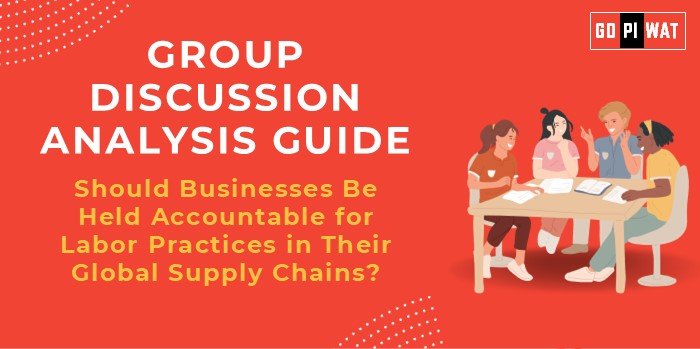📋 Group Discussion Analysis Guide: Should Businesses Be Held Accountable for Labor Practices in Their Global Supply Chains?
🌐 Introduction to the Topic
Opening Context: “With globalization driving international trade, businesses often source labor and materials from developing regions to minimize costs. However, growing concerns over labor exploitation, child labor, and unsafe working conditions have brought accountability into focus.”
Topic Background: Global supply chains, which connect companies to suppliers worldwide, often operate in regions with weaker labor laws and oversight. Prominent cases such as the Rana Plaza tragedy (2013) in Bangladesh and child labor in cocoa production highlight the urgency for ethical business practices.
📊 Quick Facts and Key Statistics
• 👶 Child Labor Statistics: Over 160 million children are involved in child labor globally, many in supply chains (ILO, 2023).
• 💵 Cost Efficiency Motivation: 30% cost reduction drives companies to outsource production to low-income countries (McKinsey Report).
• 🛠️ Forced Labor Reports: Over 27.6 million people are trapped in forced labor worldwide (Global Slavery Index, 2023).
🤝 Stakeholders and Their Roles
- 🏢 Businesses: As key drivers of supply chains, they determine sourcing practices and profit margins.
- ⚖️ Governments: Responsible for implementing and enforcing labor laws and ethical standards.
- 👷 Workers and Unions: Laborers often face exploitation without proper representation; unions advocate for fair wages and conditions.
- 🌱 NGOs and Watchdogs: Organizations like the Fair Labor Association monitor and expose unethical practices.
- 🛍️ Consumers: Increasingly demand transparency, ethical sourcing, and accountability through purchasing decisions.
🏆 Achievements and Challenges
✨ Achievements:
- 🏷️ Fair Trade Initiatives: Brands like Patagonia and H&M have adopted fair labor practices.
- 📜 Legislative Efforts: Laws like Germany’s Supply Chain Act and California’s Transparency Act enforce accountability.
- 🤝 Corporate Social Responsibility (CSR): Ethical branding helps businesses improve reputation and trust.
⚠️ Challenges:
- 📉 Lax Regulations: Developing countries often lack enforcement of labor standards.
- 💰 Cost Constraints: Ethical practices may increase operational costs, reducing competitiveness.
- 🔍 Transparency Gaps: Complex supply chains make oversight challenging.
🌎 Global Comparisons:
- 🇩🇰 Positive Example: Denmark has successfully implemented corporate responsibility frameworks, emphasizing ethical trade.
- 🇨🇮 Negative Example: In regions like West Africa, cocoa production still involves widespread child labor.
🗣️ Structured Arguments for Discussion
Supporting Stance: “Businesses profit from global supply chains and must be held accountable to ensure ethical labor practices, preventing exploitation and forced labor.”
Opposing Stance: “Holding businesses entirely accountable overlooks the role of governments in enforcing labor laws and economic challenges faced by developing countries.”
Balanced Perspective: “While businesses must integrate ethical practices into supply chains, shared responsibility with governments and NGOs ensures effective and sustainable reform.”
💡 Effective Discussion Approaches
- 📜 Opening Approaches:
- “Over 27.6 million people face forced labor worldwide, and businesses must address this as part of their corporate responsibility.”
- “The Rana Plaza collapse is a tragic reminder of the human cost when accountability in supply chains is neglected.”
- 🛠️ Counter-Argument Handling:
- “While cost pressures exist, businesses can adopt sustainable practices without significantly affecting profitability, as shown by Patagonia.”
- “Governments’ role does not absolve companies from ethical responsibilities as they directly profit from global labor markets.”
📈 Strategic Analysis of Strengths and Weaknesses
- 🏅 Strengths: Growing global demand for ethical products; consumer awareness through media exposure.
- ⚠️ Weaknesses: Higher costs for companies implementing ethical practices; lack of supplier transparency.
- 💡 Opportunities: CSR and fair trade initiatives to build brand trust; partnerships with NGOs to improve labor conditions.
- ⚡ Threats: Boycotts and reputational damage from unethical practices; resistance from low-cost suppliers unwilling to adapt.
🎓 Connecting with B-School Applications
- 📚 Real-World Applications: Case studies in ethical business models, such as Unilever’s Sustainable Living Plan.
- 💬 Sample Interview Questions:
- “Should profit margins justify unethical labor practices?”
- “How can businesses ensure supply chain transparency in developing regions?”
- 🔑 Insights for B-School Students: Ethical practices enhance long-term sustainability and brand equity; supply chain management must balance cost efficiency and ethical standards.


